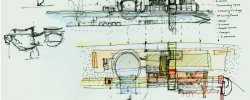MIT Department of Architecture

PhD students complete 144 units (not including registration in 4.THG) during their residency at MIT. This is usually accomplished over the first two years of residency by enrolling in an average of 36 units per term, the equivalent of three subjects. The breakdown of required subjects is as follows:
- 4.661, Methods Seminar, is taken each fall term for first two years—2 x 12 = 24 units
- A minimum of six lecture or seminar subjects—6 x 12 = 72 units
- 24 additional units of lecture or seminar subjects, or via enrollment in independent research studies with HTC faculty—2 x 12 = 24 units
- 24 units devoted to independent thesis research in preparation for the general exams or dissertation proposal (enrolled under the thesis advisor or under others with consent; 4.683 Preparation for HTC Qualifying Paper, 4.684 Preparation for HTC Major Exam, or 4.685 Preparation for HTC Minor Exam)—24 units
Independent study subjects may be taken with advisor approval after the first year of residency. No more than one independent study project may be taken per term, and no more than 12 units may be devoted to any one research project. One independent study project may be devoted to minor exam preparations. Registration for an independent study project requires completion of a departmental Independent Study Project form, this constitutes a contract for the deadlines and deliverables for the subject.
Note: All required credits must be completed before the beginning of the fifth semester. Students failing to make satisfactory progress will receive a warning to that effect, and may incur penalties such as registration hold or loss of funding.
Advancement to Candidacy:
A student is advanced to doctoral candidacy on completion of the following “hurdles, ” which should be completed by the third year of studies:
- Qualifying paper
- General exam: major and minor fields
- Language requirement
- Dissertation proposal
It is the student's responsibility to plan these hurdles appropriately in consultation with his/her advisor, in order to fill out the planner for HTC degree requirements available from the HTC office (Room 10-303). The planner must be submitted in the fall of the second year, with updates submitted as needed. The order in which hurdles are to be completed can be determined by the student in consultation with his/her advisor. All pre-thesis requirements* must be completed and approved by June of the third year. Failure to complete pre-thesis requirements by the end of the Spring term in the third year (semester 6) may result in withdrawal of funding. [* “Pre-thesis” includes the dissertation proposal. When that document is completed and filed, assuming all other hurdles are completed, then the student may enroll in “Thesis, ” 4.THG.]
Additional paperwork must be submitted to confirm completion of each of the above hurdles; this paperwork is signed by the student’s advisor and by the Director of HTC.
The HTC faculty meets at the end of each Spring semester to review student progress in general and advance students to the status of candidacy (also known as “ABD”). Once approved, copies of the internal HTC documents are submitted to the Department of Architecture degree administrator and filed in the student's official departmental file. The degree administrator informs the Registrar when degree requirements have been fulfilled, and allows the Institute to certify candidacy.
Qualifying Paper
It is strongly recommended that work on the QP be completed within one month. The paper must be the result of a seminar or directed research conducted during the student's HTC study at MIT and may not be part of thesis research. The instructor for the class administers the paper, but if this faculty member is outside HTC, the paper must also be read by a member of the HTC faculty. The core criterion for the paper is that it should be ready for publication in a scholarly journal. Since this requirement should be completed before the general exams, the paper topic should be discussed with the advisor no later than the third semester.
General Examination: Major and Minor Fields
The fields of examination are set by mutual agreement between the student and the advisor. The purpose is to demonstrate the breadth and depth of the student's critical awareness of the discipline in which he or she works. Most universities, research institutions and other potential employers must be assured a graduate has areas of competence beyond his or her specialization.






